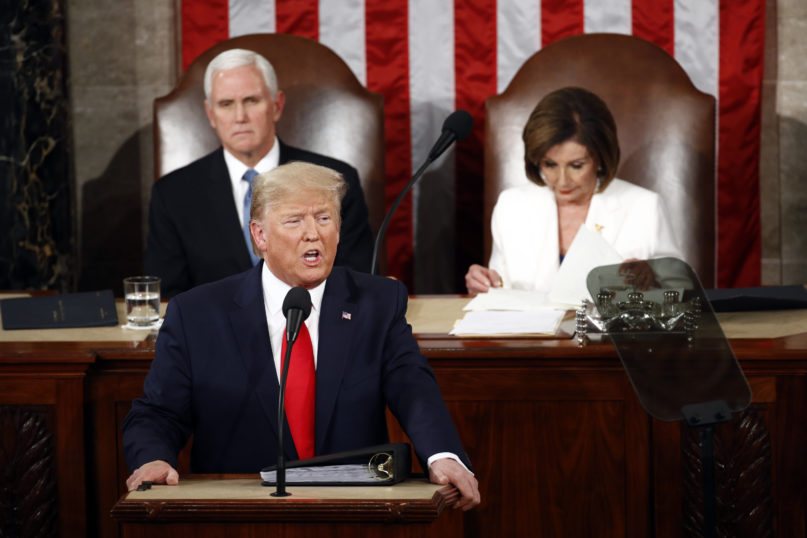(RNS) — Does the president of the United States believe the religious liberty of all citizens of the United States deserves protection?
In his State of the Union address on Tuesday (Feb. 4), President Trump spoke at length of his dedication to religious freedom.
“In America, we don’t punish prayer,” he said. “We don’t tear down crosses. We don’t ban symbols of faith. We don’t muzzle preachers and pastors. In America, we celebrate faith, we cherish religion, we lift our voices in prayer, and we raise our sights to the glory of God.”
But, what if your loved one was killed by a white supremacist?
The president made no mention of the synagogues and mosques bombed and defiled by white nationalists.
He vehemently criticized California for barring law enforcement from targeting people based solely on their immigration status, stating, “The State of California passed an outrageous law declaring their whole state to be a sanctuary for criminal illegal immigrants — with catastrophic results.”
Yet he was silent with regard to the murderous synagogue shootings in San Diego and Pittsburgh, where innocent Jews were gunned down for advocating on behalf of legal refugees and asylum seekers.
While he proclaimed himself a champion of religious freedom, he made no mention of record rates of anti-Semitism and Islamophobia in our country. His words and his omissions suggest that only some lives are protected. Only some deserve religious freedom. Only some deserve to practice their faith without being targeted.
More and more frequently, Islam is not protected as a religion in this country. Instead it is treated as a dangerous and deadly political ideology. The Muslim ban has been expanded, and the nation that turned its back on Jewish refugees in the 1930s and 1940s is repeating its crime by closing its doors to refugees fleeing persecution today.
Since 2010, 201 anti-Shariah law bills have been passed in the United States. But no laws have been passed against Christian Dominionism, a movement that endorses the Christian theocratic rule of society and advocates for a government that is based on a radical extremist interpretation of Christian Scripture. In fact, those religious views, held by some of the president’s key policy advisers, are being infused into U.S. public policy in ways we find alarming.
In his State of the Union address, the president spoke of winning the war on “radical Islamic extremism” abroad, while ignoring radical extremism targeting American religious minorities here. These attacks, initiated and endorsed by groups who advocate for violence, like the Christian Identity Movement, are fueled by Trump’s rhetoric.
And young people in Texas are listening.
Young people like 18-year-old Joel Schrimsher of Brownsville, who threatened to mail a bomb to the Federal Reserve, set a mosque on fire and shoot at a synagogue in October of 2019. Or 21-year-old Patrick Crusius who drove down from Allen to El-Paso to shoot 22 people at a Walmart, specifically targeting Hispanics. He was inspired by the Christchurch, New Zealand, mosque shootings and the right-wing conspiracy theory known as the “Great Replacement,” which compelled him to protect white Americans from evil invaders.
Christians are worried about the outsized influence of radical fringe groups, too. Groups like Christians Against Christian Nationalism educate and advocate against the weaponization of Christian faith for political gain or incitement of violence against minorities.
The president declared, “The United States of America should be a sanctuary for law-abiding Americans — not criminal aliens!” But not all law-abiding Americans have sanctuary here. Nor are all citizens who break the law held accountable. In order to divert our attention from real threats to our democracy, our leaders call innocent human beings “criminal aliens” and treat them as enemies of our nation, even if they have done nothing but flee violence in order to try to protect themselves and their families.
So who receives protection here? Both the president’s speech and his silence speak volumes. We are not reassured. Are you?
(Imam Omar Suleiman is the founder and president of the Yaqeen Institute for Islamic Research. Rabbi Nancy Kasten is chief relationship officer for Faith Commons. The views expressed in this commentary do not necessarily reflect those of Religion News Service.)





